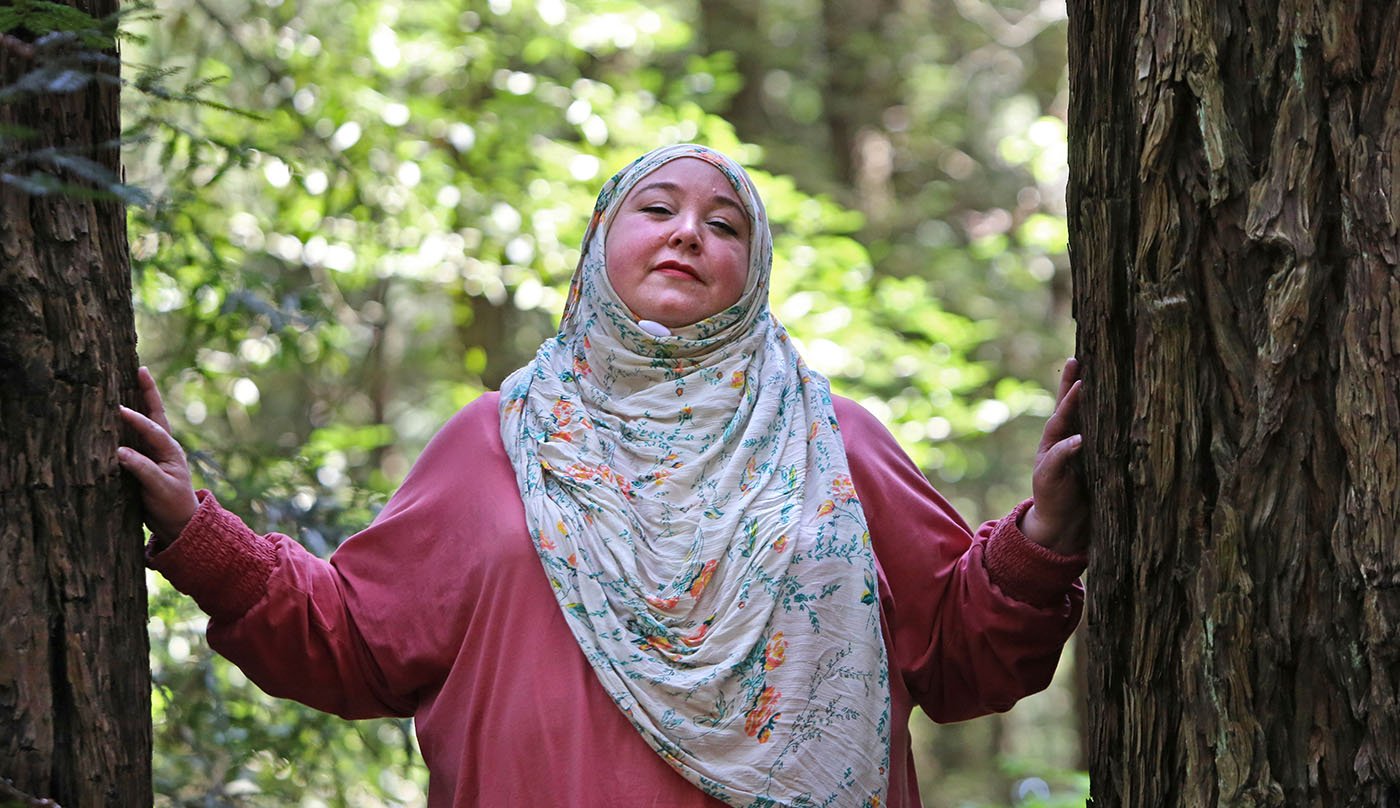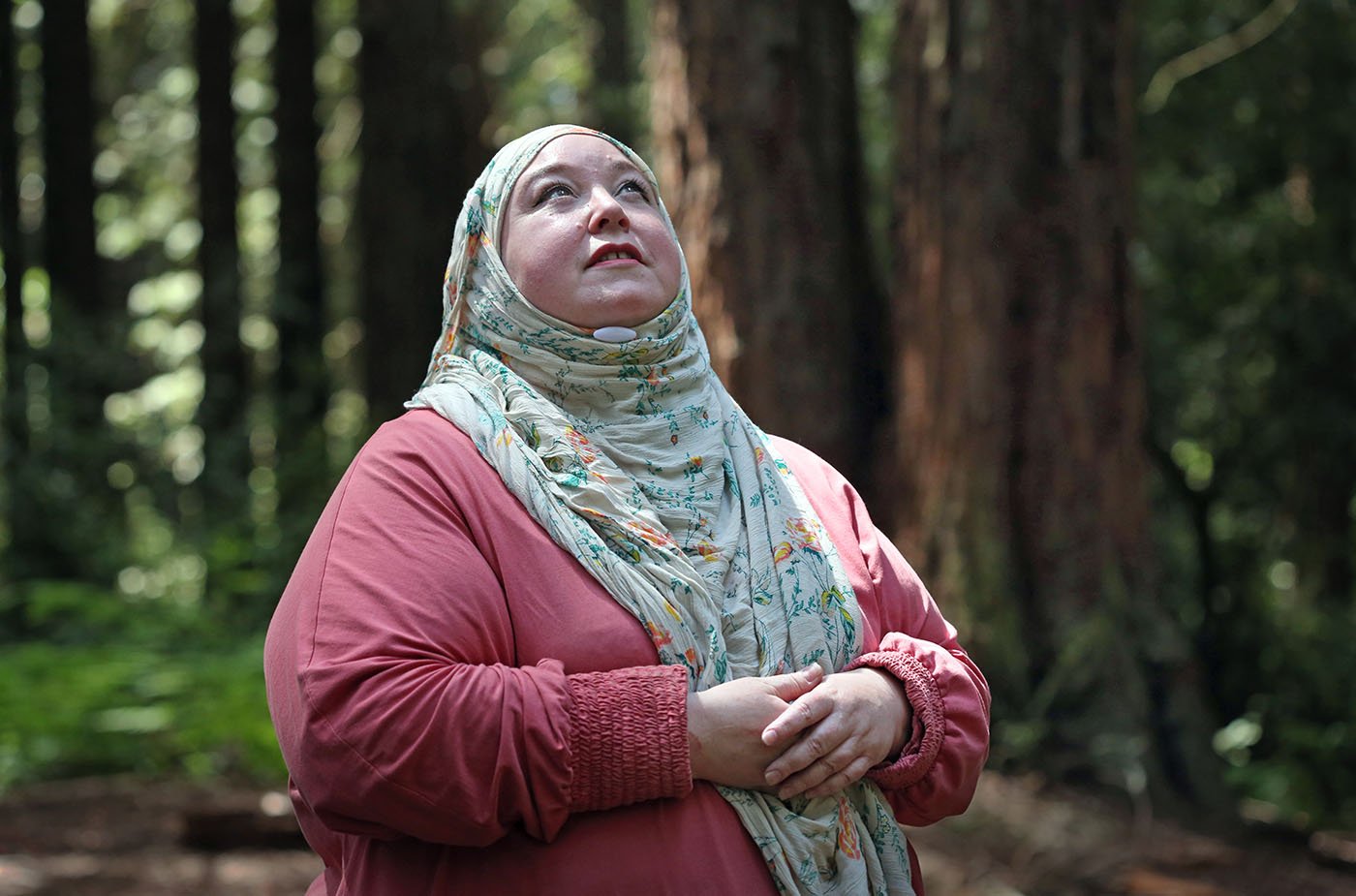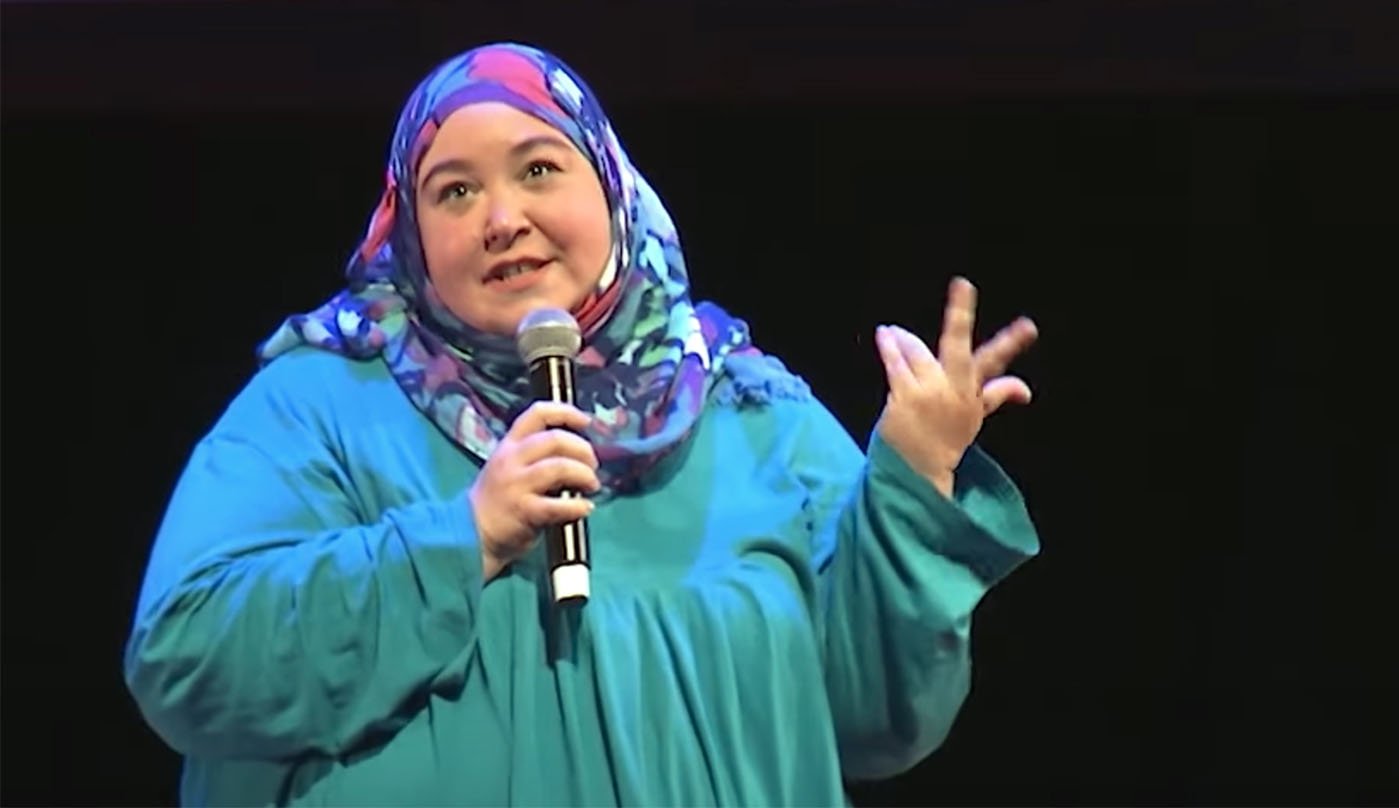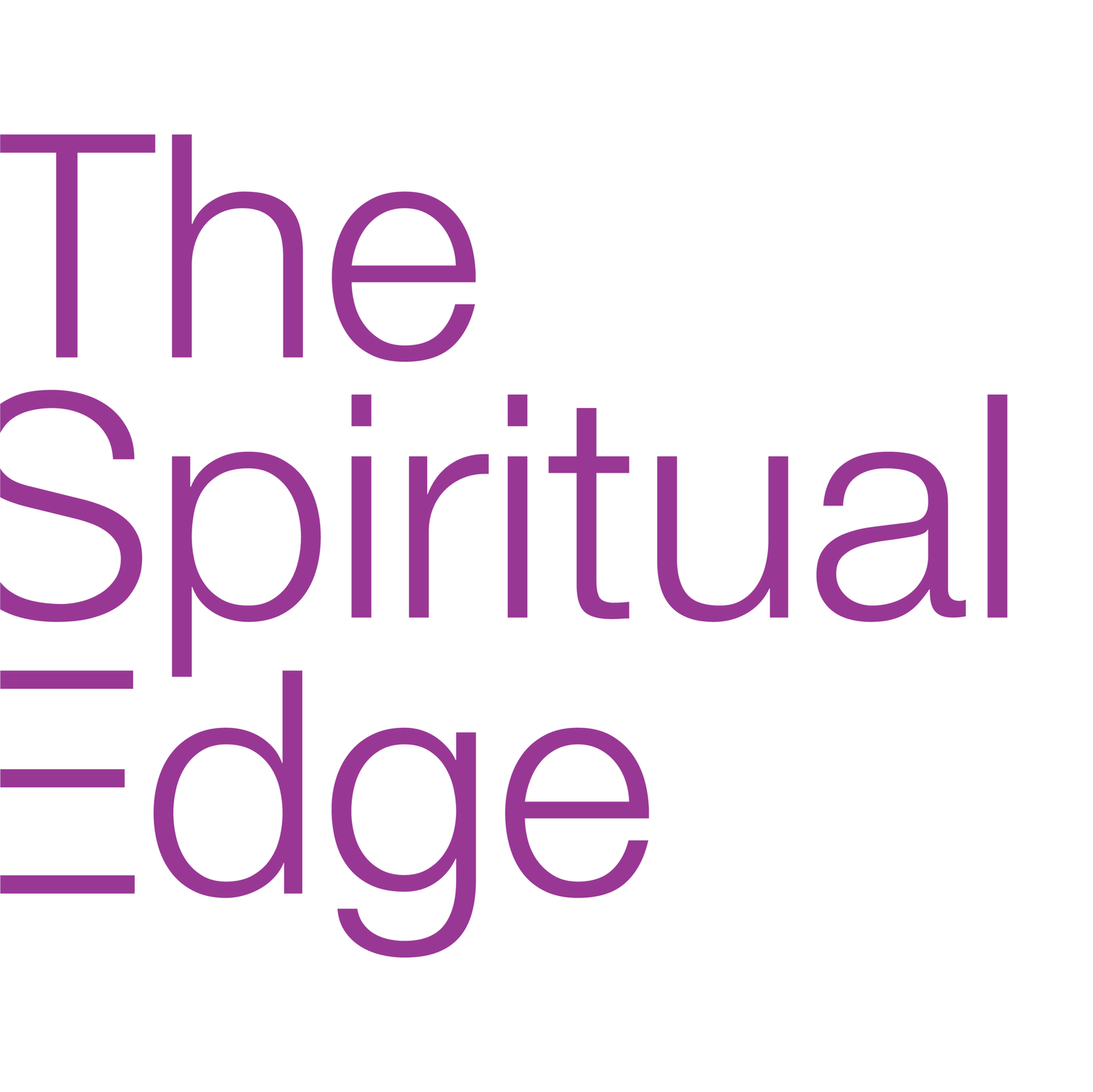Becoming Muslim: SOFIE
Keeping the faith and humor through hard times



Listen and subscribe to The Spiritual Edge wherever you listen to podcasts - Apple Podcasts, Spotify, Google Podcasts.
By Hana Baba
“I say, ‘I can’t bomb on stage cuz I’m one bad joke from Guantanamo.’”
Sofie Lovern says Islam was probably the last religion she would have ever seen herself converting to. She says she had this image, “of these women who were who were so oppressed and covered up.”
Sofie is a stand-up comedian from Oakland, California. She's a 46-year-old divorced mother of three. She has these pink cheeks that turn red when she’s giggling. She laughs a lot and is constantly cracking jokes. She jokes about her life and all the parts that make up who she is.
She jokes: “I'm actually half Hispanic, half Mexican, half white, and 100 percent Muslim. And it does cause a little cultural confusion from time to time. “
Sofie frequents an Oakland comedy club called Copper Spoon. She tries to come every Tuesday night. She says it feels like home.
She says there aren’t many Muslim women comedians who wear the hijab. In fact, there aren’t many Muslim standup comedians period.
“I mean, they're out there,” she says. “But most of them joke about just regular people stuff, like a guy named Muhammed…But then I get up there and make jokes about being a Muslim comedian.”
She’s had plenty of material to work with in a post 9/11 America.
“I say, ‘I can’t bomb on stage cuz I’m one bad joke from Guantanamo.’”
Curious in California
Sofie grew up in Southern California. Her family was Catholic, but they were not too religious.
Her family life was unstable. Her dad left when she was 18. She and her mom struggled to make ends meet. She had to drop out of college to make money. Things got so bad she became homeless and moved north to stay with family in the San Francisco Bay Area.
She spent a lot of time with her cousin. They had something big in common. They were both questioning the Christianity they grew up with. They talked about God, and together, they started researching other religions.
“I went to Pegasus Books in Berkeley and I got a used Quran and I got a used biography of the Prophet Muhammad,” she says.
“I started reading up and realized, ‘Wow, this is exactly what I think.’”
As Sofie read more and more, she says things started to fall into place.
“And if it makes sense, if it's logical, then I can accept it. You know what I mean? Even if it was completely new and foreign to me.”
As she contemplated Islam internally, things on the outside weren’t going so well. Sofie got pregnant and things were rocky with her boyfriend.
“My son's father left me and he ran back to Mexico,” she says. “I didn't know how I was going to tell him that I was planning on becoming Muslim. And then he left and so he made that part easy because he took off on me.”
Now Sofie was on her own, pregnant, and going to school. Her life was hard and it was busy. And that internal, spiritual search was happening at the same time.
Then her cousin—the one who was studying religions with her—got to the point where she was converting to Islam. Sofie went to her ceremony at the mosque.
She says by that point, “I was pretty ready to be Muslim, but I waited because like I said, I was reading the biography of the Prophet’s life. And I wanted to finish that. And because I don't jump into things, I felt like it was a very serious decision.”
Sofie did more reading and sat with herself a lot.
Then Sofie went to the mosque where her cousin had converted. Surrounded by the congregation, she gave her Shahada, the testimony of faith that makes you a Muslim. Nothing had prepared her for how intense that moment would be.
She says in that moment she thought about her unborn son, about his dad, her financial struggles—her whole life. She chokes up emotionally as she recalls it.
“I felt like I had messed up, up to that point. You know, they say that when you convert, when you take your Shahada, that all your sins are forgiven. If I could tell you, that at that moment you can feel it. You can feel it happening. It's like being washed— not with water, but with light.”
Sofie was immediately surrounded by people in the room.
“I got hugs from all the ladies and they all welcomed me into Islam,” she says. “It was a beautiful moment. I had seen my cousin go through it and it was beautiful for her as well.
First comes conversion, then comes marriage?
Sofie admired her cousin’s experience. She wanted that for herself.
But her cousin had also gone through something else. Right after she converted she got married to another convert.
Sofie wanted to get married, too. In her new mosque community that was the expectation. So within a few weeks of becoming Muslim the Imam told her, since she was single and pregnant, she should get married. He said that he would help her to find a husband.
Sofie went along with it. She had a baby son on the way and marriage didn’t sound like a bad idea. The Imam was from Morocco and regularly made trips home. On one trip, Sofie says, “He had brought back some photos and little bios for guys that he wanted to find wives for. And there were several choices, I guess.”
The Imam recommended a man from his old neighborhood in Morocco. He spoke Spanish and Sofie did, too. They started corresponding and very quickly, the man made an offer to Sofie.
“‘Come to Morocco. Visit, and if you like me then we'll get married,’ is kind of what his offer was,” she recalls. “And that seemed okay. I didn't have anyone warning me not to do it and it just seemed like a great opportunity. I could go there and learn about Islam and learn how to speak Arabic. Maybe find, a nice, romantic relationship with someone.”
She adds, “That was not really the reality.”
Post conversion weddings
People who work in Muslim marriage spaces say it’s not uncommon to hear about mosque leaders finding matches for new convert women who are single. In some cases as soon as they become Muslims.
Jenny and Rufus Triplett are a marriage counselor couple who have worked with Muslim American communities for decades.
Jenny Triplette chides the practice, saying, “You're a convert. Why is somebody automatically bringing you someone to marry? Why is that like the first thing?”
“I would never, ever suggest that a sister go get married right off the bat,” emphasizes her husband Rufus.
“Learn what the religion is,” Jenny says. “Learn what your rights are. Learn all that you need to do. There's no need to rush into marriage.”
Jenny says people sometimes put too much trust in mosque leaders to manage their personal affairs. She says, “Islam definitely tells you not to put faith in man. You're putting all your faith in this man that you don't know because he’s a sheikh, an Imam. He's still just a man.”
Likewise, she says, putting all the blame on the Imams is misguided, too.
“How much research are you doing?,” she asks. “ I don't care how new you are. You’re putting so much on the Imam, but what didn't you do?”
Sofie admits that at the time, she was starry-eyed and maybe naive.
Juliette Galonnier researches converts to Islam. She’s a political science professor at Sciences Po in Paris. She says vulnerability is a big issue for converts like Sofie.
Especially, she says, “For those who try to convert by themselves. Those who did their own personal research in books on the internet, but who didn't really have a strong network of Muslim friends. So these people talk a lot in interviews about their vulnerability as new Muslims.”
Galonnier says vulnerability comes from that experience of loneliness.
Married in Morocco
Sofie was in a vulnerable place. She continued corresponding with the man in Morocco and traveled there with her eight-week-old son.
“The day after I got there,” she says, “He's like, ‘I love you and I want to marry you.’ And I was like, ‘Okay, everything seems good.’”
Soon things were far from good. They got married, but Morocco was a total culture shock, and Sofie started to struggle.
“I mean, moving into an environment where you don't speak the language. They have a completely different culture,” she adds. For example, she had to learn how to use a squat toilet.
At first, the couple communicated in Spanish. “Because I speak Spanish, and he spoke French, Spanish, and Arabic. And we used Spanish until we learned enough of each other's languages to communicate a little bit better,” she says.
Sofie says she tried to get used to the culture, the people, the mannerisms. She thought she was in Morocco for the long haul, that this was going to be her new home. But, her husband had other plans. He wanted to live in the U.S.
“Within three weeks, he was pushing me to come back here,” Sofie says. “We did go try to get him a visa. We went to the American consulate and we were denied. We found out later that I could come here and apply. So once he figured that out, he sent me back here.”
American culture clash
Sofie came back to the U.S. and filed for permanent residency for her husband. He joined her nine months later. But she says it soon became an unhappy marriage.
“He would say things like women aren't supposed to talk. They're supposed to cook and clean and never sit down,” she says. “He was very threatened if I was resting. He didn't even like me to sit and crochet. ”He said that was being lazy.”
There was another big thing that had to do with a core part of who Sofie was. She loved comedy. She cracked jokes wherever she went. She’s a big laugher, finding humor all around her. She says her husband just didn’t get any of it.
“He had no sense of humor, you know? One day I asked him, I said, ‘How long was the surgery?’ He said, ‘What surgery? I said, you know, the one where they removed your sense of humor.’ But he didn't laugh. He never laughed.”
Comedy was a big part of what she wanted to do with her life. She says he discouraged her from pursuing it at all.
“It was torture living with someone who didn't get any of my jokes, didn't laugh at any of my jokes,” she says. “He's always like, ‘Moroccan ladies don't do that.’ Okay, well then marry a Moroccan. I don't know what to tell you. You didn't marry a Moroccan lady. I'm not gonna be like one, whatever that means.”
“He spent 10 years telling me who to be, but he never found out who I was,” she says. “Why? Why are you so dead set on changing me as a human?”
The Tripletts, the marriage counselors, have seen this scenario many times.
“There's a lot of questions that you need to ask before marriage,” says Jenny, “If you are expecting me to learn your culture, and live with your culture, gravitate to your culture, there has to be some mutual respect.”
There's a lot of questions that you need to ask before marriage, but if you're entertaining someone who is an immigrant foreign born: what are your ideas? Do you know American culture? Do you, do you respect American culture?”
Sofie eventually filed for divorce.
The Imam who connected Sofie with her husband all those years ago is Imam Yassir Chadly. He confirms many of the details of Sofie’s story, including that he introduced her to her ex-husband in the first place.
“He didn't have any bad things like drugs or drunk or something,” Chadly says, “And he wanted to raise this boy as a father to him. That was my essential connection that I wished for her. That was what I wanted.”
Chadly says his intention was to help Sofie. He hasn’t had much contact with her since the wedding 26 years ago, but he did hear about her struggles with her husband—and her divorce.
“I have felt bad about it because that was not my wish that this will happen,” he says. “Of course, when you meet people to be together, you wish for them the best thing.”
Now he says, he wishes he’d been more present.
“I never sat with her to ask her how is this man? How is he treating you?,” he says. “And I never sat between them and continued to groom them to become good. I just expected that they will do good to each other.”
Thinking back, Chadly says he suspects that maybe the man he thought was such a good match for Sofie really just wanted to marry her so he could come to the US.
Over the years, Chadly has seen a lot, and he says he’s changed his mind altogether about these kinds of marriages.
“I think most of it doesn't work. Ninety-nine percent I would say it doesn't work,” he says.
It certainly didn’t work for Sofie.
She ended up alone with three children, cut off from her mosque community and starting to question why she chose Islam in the first place.
“I just had to come full circle again,” Sofie says. “And remember why I converted. And remember that it had nothing to do with Moroccan culture. It had nothing to do with him. And his misogyny. I had to stop and separate myself from that cultural bullcrap and what the religion says. Because a lot of it is absolutely in contradiction to what the religion says.”
Healing through comedy
Sofie needed to heal. And to rediscover herself.
There was a time right before she left her husband, she says, that she had almost given up. “I was kind of a shell of myself,” she says. “But what I found is after I left, it was like a rubber band that had been stretched. It just went right back because I had spent so long bending over backwards and trying to be everything that he told me I should be. It just snapped right back.”
Rediscovery for Sofie meant getting back to who she was and a big part of that was humor and comedy.
Sofie laughs, “I have a weird brain. I have this sort of constant stream of hilarity running through my brain. I'm never bored. I'm rarely lonely. And my brain keeps me entertained.”
She knew comedy for her wasn’t just funny thoughts in her head. It was more. She was raised on comedy. She grew up watching comedy greats like Robin Williams, Steven Wright, and George Carlin.
She knew she had a talent. A couple of years after her divorce, she felt she was ready to go on stage. She started going to open mics. She was a featured comedian at Oakland’s 2019 TEDx event. She joked about being a Muslim woman in a post 9/11 America.
“So I never get greeted at Walmart,” she jokes. “Every time I go in there's like those twin greeters. And they're looking at each other like, ‘I'm not gonna greet her. You gonna greet her?’”
“With CVS on the other hand, they have excellent customer service. By customer service I mean surveillance.”
On this day, just before the first Covid lockdown, she brings her two now-teenaged daughters to comedy night at Oakland’s Copper Spoon Club where she’s a regular.
She jokes about being divorced.
“They say that having a sense of humor is like a coping mechanism, but it doesn't feel like coping,” she says.
“Everyone has to look at life through some kind of lens. If you can look through the lens that makes you laugh, that makes you a lot happier as a person.”
***
Hana Baba is the host of Becoming Muslim. She also hosts KALW's award-winning newsmagazine, Crosscurrents, and The Stoop podcast: stories from across the Black diaspora.
The Spiritual Edge is a project of KALW Public Radio. Funding for Becoming Muslim comes from the Templeton Religion Trust.
